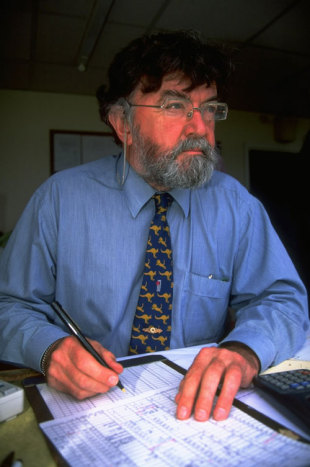Bill Frindall

|
|||
|
Related Links
|
|||
FRINDALL, WILLIAM HOWARD, MBE, died of Legionnaires' disease on January 30, 2009, aged 69. Bill Frindall was the most famous of all scorers and statisticians. His reputation and celebrity, which spread to those who knew little of cricket, derived from his 43 seasons (1966-2008) scoring for BBC Radio's Test Match Special. The reputation came from the excellence of his work; his celebrity came from his mellow microphone voice and a high level of confidence and self-regard, which he used to build up a considerable sideline as an author and speaker. Sometimes he gave the impression that brain surgery and world peace might be trivialities in comparison to the great issues of leg-byes and first-class status. But he single-handedly elevated an obscure corner of an arcane sport: he made it matter because he insisted that it did matter.
Frindall got the TMS job in the course of a sequence in which five BBC scorers either died or resigned in rapid succession. In his autobiography, he denied this was a rerun of Kind Hearts and Coronets. Nonetheless, fresh out of the RAF - he had stayed on after national service - and with minimal scoring experience, he faced surprisingly little competition. The BBC were doubtless impressed by his application letter, written in his trademark copperplate hand. If so, it was a shrewd judgment: the handwriting was the key to the man. His scoring - using the linear method pioneered, though not invented, by the Australian Bill Ferguson - was astoundingly accurate, as well as neat. Above all, it was based on phenomenal powers of concentration, which he believed he mastered serving in a NATO war-room: "The handwriting was a bonus," said Peter Baxter, TMS producer almost throughout the Frindall era, "but it was his concentration that made him the master." From his debut at Old Trafford, aged 27, until his death, Frindall scored every Test in England for TMS. Indeed, he never missed a day - except for the Saturdays during the brief period when he was horribly miscast as the cricket correspondent of the Mail on Sunday. Quite possibly, he never missed a ball, since he believed that toilets were places to be used only during intervals.
Over the years, Test Match Special changed little, but Frindall seemed to change hardly at all: the beard grew greyer and the tone gruffer, as he corrected the errors of the more chaotic members of the commentary team with the air of an exasperated schoolmaster, but he always sounded good-humoured. This could be misleading. His first stint as Wisden's chief statistician ended in 1978 amid fearsome acrimony, partly over editor Norman Preston's insistence that the England v Rest of the World fixtures in 1970 should be regarded as Tests. There was another horrendous spat with the even more obsessive Irving Rosenwater, then scoring for TV. And his personal life was torrid - he was divorced twice - until he settled down in Wiltshire with his third wife Debbie and new daughter Alice in the 1990s.
Frindall happily adapted to new technology, but computerisation eroded his competitive advantage because his matchless accuracy mattered less: he never cared for the more obscure stats that became popular after the construction of cricketing databases. Ever consistent and inflexible, he rejected the ICC's insistence on regarding the Australia- World XI fiasco of 2005-06 as a Test, and thereafter his records differed from almost everyone else's. But his dedication ensured that he remained pre-eminent. He edited Playfair Cricket Annual for 23 years, five editions of The Wisden Book of Test Cricket and four of The Wisden Book of Cricket Records. He was the president of British Blind Sport. In his youth, he bowled quite fast for teams such as the RAF and Hampshire Seconds, and remained a zestful club cricketer until he died. Indeed, Frindall had just returned from tours of Malta and Dubai when he became ill, but characteristically insisted on fulfilling an engagement to address the Herefordshire Cricket Society. His audience assumed he had flu, but his condition rapidly deteriorated over the next week. After he died, the England players wore black armbands for the Test in Kingston. Frindall revelled in having been born on the opening day of the longest Test - the ten-day "timeless" match in Durban; he was buried the same day as the shortest, the ten-ball abandoned match in Antigua.

